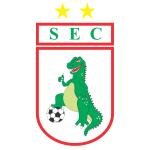| Coach | NA |
| Venue | Estádio Governador Antônio Mariz |
Sousa predictions
Predictions for Sousa: See upcoming and historic predictions for Sousa below.
Disclaimer: Past performance does not guarantee future results. Betting involves risk; only wager what you can afford to lose. Always gamble responsibly.
Sousa latest results
About Sousa
Sousa Esporte Clube, commonly known as Sousa, is a Brazilian football club based in Sousa, Paraíba. Founded on July 10, 1991, the club has since established itself as a significant player in the Brazilian football landscape, particularly within the Paraíba state.
The club's colors are green and white, and it is affectionately known as 'Dinossauro do Sertão' or 'Dinosaur of the Outback.' The dinosaur emblem is a nod to the region's rich paleontological history, with numerous dinosaur fossils discovered in the area. Sousa plays its home games at the Estádio Marizão, a stadium with a capacity of approximately 10,000 spectators.
Since its inception, Sousa has participated in the Campeonato Paraibano, the top football league in the state of Paraíba. The club has consistently performed well in the competition, winning the title in 2009 and finishing as runners-up on several occasions. Sousa's victory in 2009 marked a significant milestone in the club's history, as it was the first time a team from the Sertão region had won the state championship.
In addition to its domestic success, Sousa has also made appearances in national competitions. The club has competed in the Campeonato Brasileiro Série D, the fourth tier of Brazilian football, and the Copa do Brasil, the country's premier knockout cup competition.
Despite its relatively short history, Sousa has produced several notable players who have gone on to have successful careers both domestically and internationally. These include Marcelinho Paraíba, a former Brazilian international, and Fábio Bilica, who has played in several top European leagues.
Off the pitch, Sousa is known for its passionate and dedicated fan base. The club's supporters are renowned for their loyalty and fervor, regularly turning out in large numbers to cheer on the team. This unwavering support has played a crucial role in Sousa's success and has helped to foster a strong sense of community and identity within the club.
In recent years, Sousa has faced challenges, including financial difficulties and fluctuating performances on the pitch. However, the club's determination and resilience, coupled with the unwavering support of its fans, have ensured its survival and continued relevance in Brazilian football.
In conclusion, Sousa Esporte Clube is more than just a football club; it is a symbol of pride and unity for the people of Sousa and the wider Paraíba region. Despite the challenges it has faced, the club's spirit and determination have remained undiminished, reflecting the tenacity and resilience of the community it represents. As Sousa looks to the future, it will undoubtedly continue to play a vital role in the fabric of Brazilian football.
















